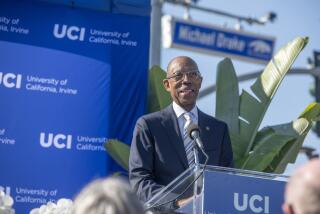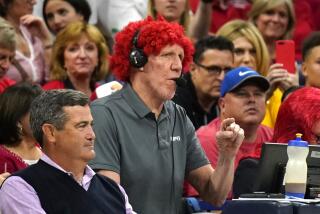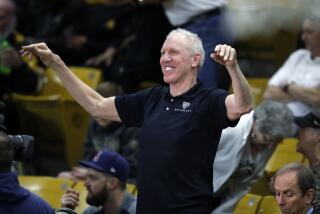Ducky Drake, Father of UCLA Athletics, Dies
Elvin C. (Ducky) Drake, who assumed a role of father confessor at UCLA for more than 60 years, died late Friday night of a heart attack. He was 85.
Drake was getting ready to attend Friday night’s UCLA basketball game when he complained of chest pains. He was taken to St. John’s Hospital and Health Center in Santa Monica where, apparently, he suffered a heart attack. He was pronounced dead at 11 p.m.
Drake entered UCLA in 1923 as a student and never left. He carried numerous titles, ranging from track and field coach (1947-1964) to trainer (1942-1972), but he was much more than that to the thousands of athletes who played for UCLA. He was always there to listen and offer advice. Even as he entered his 80s, Drake continued his dedication to the Bruins, attending all the football games and the home basketball games. He was scheduled to leave for the Jan. 2 Cotton Bowl Monday.
“He was your dad away from home,” said Gary Beban, the UCLA quarterback who won the Heisman Trophy in 1967. “He seemed to go on forever and ever and ever. He was always the guy fixing you and always a great listener.”
Drake never stopped listening or watching. It was only recently that he was no longer attending every practice.
Jim Bush, who succeeded Drake as track coach in 1964, remembers shortly after Drake’s “official” retirement that the two would meet in the stands at the track. “He’d look at me and say, ‘I don’t know what I’m doing here, what are you doing here?’ Then I’d say, ‘I don’t know, what are you doing here?”
It was a private joke that summed up Drake’s almost compulsive devotion to UCLA. Drake’s contributions did not go unrecognized. In 1973, the track stadium was renamed Drake Stadium, and in 1984 he was inducted as a charter member into the UCLA Athletic Hall of Fame. Even all the basketball and football programs continued to list him as “trainer emeritus.”
But to say Ducky Drake was the UCLA trainer is a gross misnomer. He acted as both the heart and soul of this modern-day institution and he did it with such old-fashioned common sense.
“Some people think all a trainer does is tape ankles,” Drake would often say. “Anybody can tape an ankle. Putting a bandage around their thinker is something else.”
Drake was unfailingly devoted to the players and if you told him a secret, it would stay that way.
“Ducky is easy to talk to,” then UCLA basketball coach Larry Farmer said in a 1983 interview. “I think the players realize that. Unless they do something terribly bad and get caught, whatever they say or do stops with Ducky. He’ll handle it without going to the coach.”
Drake always said that his biggest thrill was at the 1960 Summer Olympics at Rome. He was the coach of both Rafer Johnson and C.K. Yang in one of the most memorable decathlon duels in modern track and field history. Both were students at UCLA and Drake watched, without showing favoritism, as Johnson finished first and Yang second.
“To lose a friend . . . it hurts,” said Johnson, his voice softening at having to talk about Drake’s death. “I don’t think there are too many people who have gone through UCLA that don’t feel as I do. . . . If it wasn’t for Ducky, the accomplishments I had would have been difficult to achieve.
“As a coach, he had a way of breaking everything down to get inside the hearts and minds of every individual athlete.”
Amazingly, Drake was able to bridge the continually growing generation gap through the years. “You have to change with the kids when they change or you’re in trouble,” he said in 1983. “You have to at least keep even with them because, if you don’t, they’ll put you down so quick your head will spin.”
Drake was born Nov. 2, 1903 in Friend, Neb. His family moved to Ft. Morgan, Colo., where he played high school sports and then to Los Angeles, where he took a job in a lumber yard.
He wanted to become the first one in his family to graduate from college so he signed up at Southern Branch, now called UCLA. He graduated in 1927 and in 1929 was named assistant track coach. He also was the freshman track coach and cross-country coach before getting the head trainer’s job in 1942. By then, Drake was already an institution of both higher learning and common sense.
There’s no great story, or if there is Drake never told it, as to how he got the nickname Ducky. It’s assumed that it was the natural progression of anyone who’s last name is Drake.
“He was Uncle Ducky to our children,” legendary UCLA basketball coach John Wooden said. “He and his wife never had children of their own, but all of the athletes were his children.”
Drake will be buried at Santa Monica Wednesday at a private service. A viewing will be held Tuesday between 3 p.m. and 8 p.m. at Gates & Kingsley Mortuary at Santa Monica. A memorial service will be held Friday, Jan. 6; the site has not been chosen.
In lieu of flowers, Rose Drake, Ducky’s wife, has requested that donations be made to the Ducky Drake Scholarship Fund at UCLA.
“This is certainly a sad day for UCLA,” said Peter Dalis, UCLA athletic director. “Ducky has been like a second father to virtually all our coaches and athletes and was a great man. When someone thinks of UCLA, usually the first person to come to mind is Ducky Drake. His death leaves a great void at UCLA.”
More to Read
Go beyond the scoreboard
Get the latest on L.A.'s teams in the daily Sports Report newsletter.
You may occasionally receive promotional content from the Los Angeles Times.







